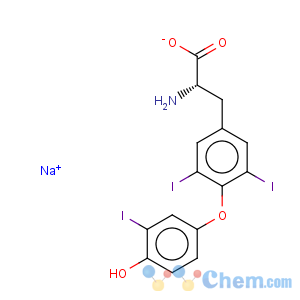You are here:
HomeProductsT3 L-Triiodothyronine (frank@chembj.com)
T3 L-Triiodothyronine (frank@chembj.com)
-
- Product NameT3 L-Triiodothyronine (frank@chembj.com)
- CAS No.55-06-1
- Purity99%
- Min Quantity1000Kilograms
- Price1~2

 View Contact Detail
View Contact Detail
-

Molecular Structure
Detailed Description
Injectable T3 L-Triiodothyronine Weight Loss and Muscle Gaining Steroid Powder CAS NO 55-06-1
Quick Detail:
Alias:3,3',5-Triiodo-L-thyroninesodiumsalt,Sodium(2S)-2-amino-3-[4-(4-hydroxy-3-iodophenoxy)-3,5-diiodophenyl]propanoate
Purity : 99%
CAS Registry Number: 55-06-1
Einecs No: 200-223-5
MF: C15H11I3NNaO4
MW: 672.96
L-Triiodothyronine CAS 55-06-1 Raw Hormone Powders T3 For Depressive Disorders & Fat Loss
Appearance: white or light yellow powder, almost tasteless.
Grade : Pharmaceutical
Grade Storage: Shading, confined preservation
Manufacturer : Yuanyang
Usage : It affects almost every physiological process in the body, including growth and development, metabolism, body temperature, and heart rate, such as, treatment of depressive disorders and use as a fat loss supplement.
Product Description:
1). Thyroid hormone drugs are natural or synthetic preparations containing tetraiodothyronine (T4, levothyroxine) sodium or triiodothyronine (T3, liothyronine) sodium or both. T4 and T3 are produced in the human thyroid gland by the iodination and coupling of the amino acid tyrosine. T4 contains four iodine atoms and is formed by the coupling of two molecules of diiodotyrosine (DIT). T3 contains three atoms of iodine and is formed by the coupling of one molecule of DIT with one molecule of monoiodotyrosine (MIT).
2). As the true hormone, the effects of T3 on target tissues are roughly four times more potent than those of T4.Of the thyroid hormone that is produced, just about 20% is T3, whereas 80% is produced as T4. Roughly 85% of the circulating T3 is later formed in the thyroid by removal of the iodine atom from the carbon atom number five of the outer ring of T4. In any case, the concentration of T3 in the human blood plasma is about one-fortieth that of T4. This is observed in fact because of the short half-life of T3, which is only 2.5 days.This compares with the half-life of T4, which is about 6.5 days.
Applications:
1). Bodybuilders take advantage of these characteristics and stimulate their metabolism by taking Cytomel (Liothyronine Sodium), which causes a faster conversion of carbohydrates, proteins, and fats. Bodybuilders, of course, are especially interested in an increased lipolysis, which means increased fat burning. Competing body builders, in particular, use Cytomel (Liothyronine Sodium) during the weeks before a championship since it helps to maintain an extremely low fat content, without necessitating a hunger diet. Athletes who use low dosages of Cytomel (Liothyronine Sodium) report that by the simultaneous intake of steroids, the steroids become more effective, most likely as the result of the faster conversion of protein.
2). It affects almost every physiological process in the body, including growth and development, metabolism, body temperature, and heart rate.T3 increases the basal metabolic rate and, thus, increases the body's oxygen and energy consumption. The basal metabolic rate is the minimal caloric requirement needed to sustain life in a resting individual. T3 acts on the majority of tissues within the body, with a few exceptions including the spleen and testis. It increases the production of the Na+/K+ -ATPase and, in general, increases the turnover of different endogenous macromolecules by increasing their synthesis and degradation.

- T3 L-Triiodothyronine (frank@chembj.com)


 eileen
eileen



